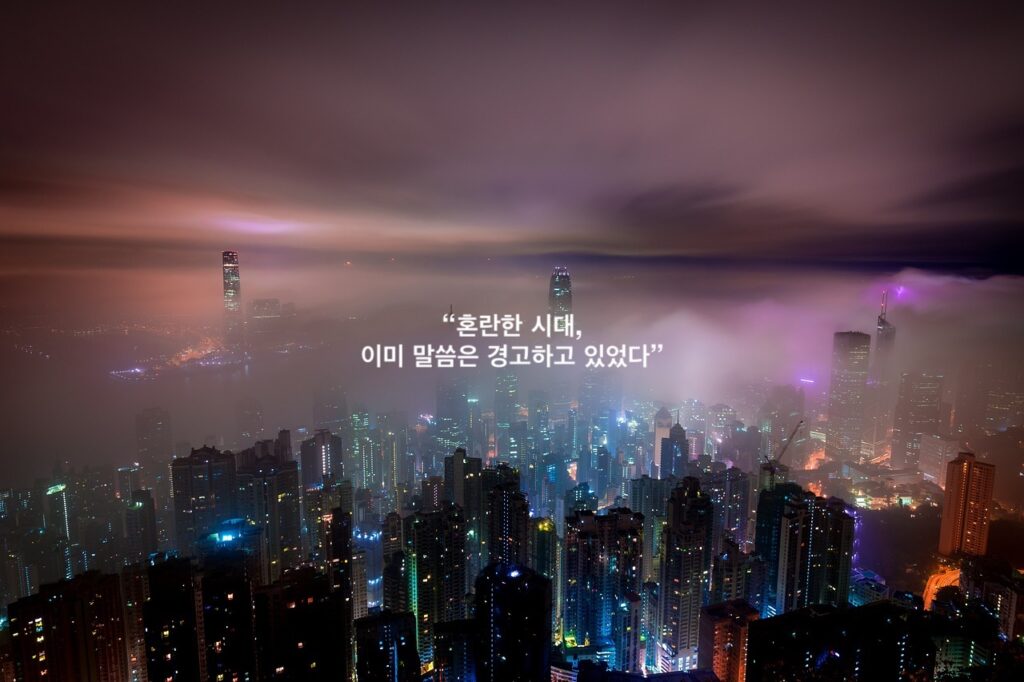Did the Tower of Babel Fall—Or Evolve?
In human history, the act of “building” has always symbolized more than mere construction. People have baked bricks, built homes, raised towers, and extended their realms through the things they built. But the Tower of Babel in Genesis 11 invites us to consider the spiritual nature of such action. “Let us build ourselves a city, with a tower that reaches to the heavens, so that we may make a name for ourselves and not be scattered over the face of the whole earth.” It was a union of technology and order, the power of solidarity, and the desire for greatness. Yet, at its center—God was absent.
The tragedy of Babel lies in humanity’s attempt to build a system based on their own will, forgetting God’s. It wasn’t just about architecture; it was a pursuit of salvation designed by human hands—a collective ambition to replace God’s throne with human structure. God confused their language and scattered their plans. Interestingly, however, Scripture does not say the tower collapsed. In human hearts, it persisted, reappearing throughout generations in new forms.
Today, we live in a completely different world. Digital technologies have erased the boundaries of space. With a single click, we connect globally. Language barriers are diminishing, and algorithms and code have become a universal language. This movement proclaims unity and integration, maximizing human convenience and efficiency. And within it, we once again see the shape of Babel—not as a towering structure, but as an intricate and vast network that surrounds us.
The essence of Babel was never its height. It was the refusal to scatter, the replacement of God’s command with human design. God had commanded humanity to fill the earth and multiply, but the people of Babel built a city and tower to avoid scattering. On the surface, it seemed like unity and cooperation. In reality, it was defiance against God’s will.
Modern civilization operates in similar ways. People no longer build cities, but construct digital worlds. In these worlds, languages are unified, values aligned, and rules standardized. Beyond cultural uniqueness, humanity is being funneled into one flow, one voice, one system.
The seamless movement of technology, culture, economy, and policy across borders is not merely a sign of progress—it may be the reemergence of humanity’s old desire to be united without God. No one is building visible towers, but invisible ones are already deeply embedded in daily life.
Above all, today’s Babel is even more powerful in its use of “one language.” In Genesis, God used language confusion to scatter human ambition. But now, we are reuniting language. English is the global standard, and computer languages link the world with emotionless precision. Information is shared in real time. Value judgments are automated through algorithms. Societies are engineered to move in predictable, calculated ways.
On the surface, these structures promise stability and efficiency. But inside, they suppress individuality and erase uniqueness. People are pressured to conform rather than be respected in their differences. Compliance is favored over critique. We gain “convenience” within systems, but lose our ability to question. We accept what’s given, choose from pre-selected options, and forget how to think beyond the framework.
Believers must not accept this current uncritically. This is not a call to reject all technology, but a plea to discern its direction. A tower may be invisible, but it always has a purpose. Does it lead to God—or does it glorify man? That is the question believers are called to ask.
Believers are called to build a different tower—not one that rises to heaven, but one where heaven comes down to earth. Babel sought to reach up; faith seeks to bring down God’s will. This tower may not be visible to the world, but it is built in quiet decisions: in worship, in habits of obedience to the Word, in daily choices aligned with truth.
We often judge by what we can see. The systems of this world prove themselves with numbers and structures. But the house God builds doesn’t always appear grand. It stands firm at the center of families, within relationships in community, and through the honest obedience of a single believer. Scripture declares, “The house built by God will not fall.”
Even now, countless pieces of information are flowing. Countless structures are being constructed. Countless standards are being defined. But is God present among them? No matter how high or sophisticated the tower, if God is not at its center, it will eventually fall. That’s why we must examine the towers being built in our lives. For whom are they built, and upon what foundation?
God scattered the people of Babel—and He still speaks today. Are the things we build truly His house—or just another Babel? To stand before this question is where the journey of faith begins.
Build on the Word Against the Invisible Tower
We often think of the Tower of Babel as a relic of the past—a failed human ambition, a shattered arrogance before God. But Babel is not confined to history. It continues today in many evolving forms. Babel did not collapse; it simply changed shape.
Today’s Babel is invisible. It’s built not with bricks, but with data and platforms, systems and networks. Within it still breathes the desire to “make a name for ourselves.” Today’s world proclaims that we can solve every problem without God—education, economy, environment, even ethics and justice.
But the core of Babel is not technology or structure—it is who is at the center. Is it man, or is it God? Are we building for our name—or living for God’s will? That answer determines whether we are building Babel or Jerusalem.
Believers must critically examine the spirit of the age. Criticism here does not mean rejection—it means spiritual discernment, a judgment based on God’s will. Today, nearly every area of life is entrusted to technology. Daily routines, finances, healthcare, education, even worship now depend on digital systems.
These systems seem convenient and sophisticated. But they often remove a crucial question: Does this structure bring me closer to God—or further away? Does this convenience deepen my faith—or dull it? Does this system make me more humble before God—or put me at the center?
We must recognize the quiet, persistent repetition of Babel in our time. It is not built in disorder—but in harmonious, appealing forms. It elevates efficiency and integration, gradually erasing faith from the public square and pushing it into private choice. Eventually, faith is silenced by systems and structures.
In such a time, believers must hold to a stronger standard. The world may change—but God’s Word does not. “Heaven and earth will pass away, but my words will never pass away.” This is the one foundation faith must hold when everything else shakes.
So what should we build? What should we focus on? If Babel tried to reach upward, God’s house expands outward. One faithful life nurtures another. Truth raises children. A genuine community forms. That is the house of God.
A life grounded in the Word may not be noticeable—but it is deep. More than visible success and speed, the Kingdom of God is built in the faithful living of each day. It is not about height, but about depth. A life rooted in prayer, in obedience, in seeking God’s will—this builds the true tower of heaven on earth.
This is not an individual task alone. The church must stand as a community of truth against the spirit of Babel. It must not be built on numbers, but on the Word. Not on programs, but on the gospel. Not on strategies, but on obedience. Not on events, but on worship.
When the church begins to resemble Babel’s structure, it may grow in function—but collapse in spirit. Buildings and systems may remain, but spiritual life is lost. The church must return to its foundation. “Your Word is a lamp to my feet and a light for my path.” This must be lived not individually, but communally.
Jesus said, “The wise man builds his house on the rock.” That rock is His Word. It stands firm in every storm. The world can build massive structures on sand. But sand collapses. When winds blow and waters rise, the truth is revealed. What will remain?
Believers must ask again and again: What am I building on? Is my faith rooted in systems—or in the Word? Is the flow I follow from the world—or from God? To stand before these questions is true discernment.
Scripture is clear about the last days. Babel will reappear—stronger and more sophisticated. Revelation calls it “the great city of Babylon,” the final structure where spiritual corruption and secular power combine. But it also says: it will collapse by its own weight. And the New Jerusalem will descend from heaven.
Until that day, we must prepare for that Kingdom on earth. Not by shouting—but by faithfully obeying. By following the Word. By refusing to give up worship. By protecting community. By looking to the Lord even in suffering. These small, steady obediences build the house of God.
Even now, Babel adds another brick. But we must choose God’s house. Truth over convenience. Direction over speed. Substance over scale. This is the true battle of the final age.
Until that day comes, we return again to the foundation: the Word. Worship. Prayer. Community. Obedience. These four must be the rock that upholds our lives. The house built on this foundation will not fall.
Maeil Scripture Journal | Special Series




